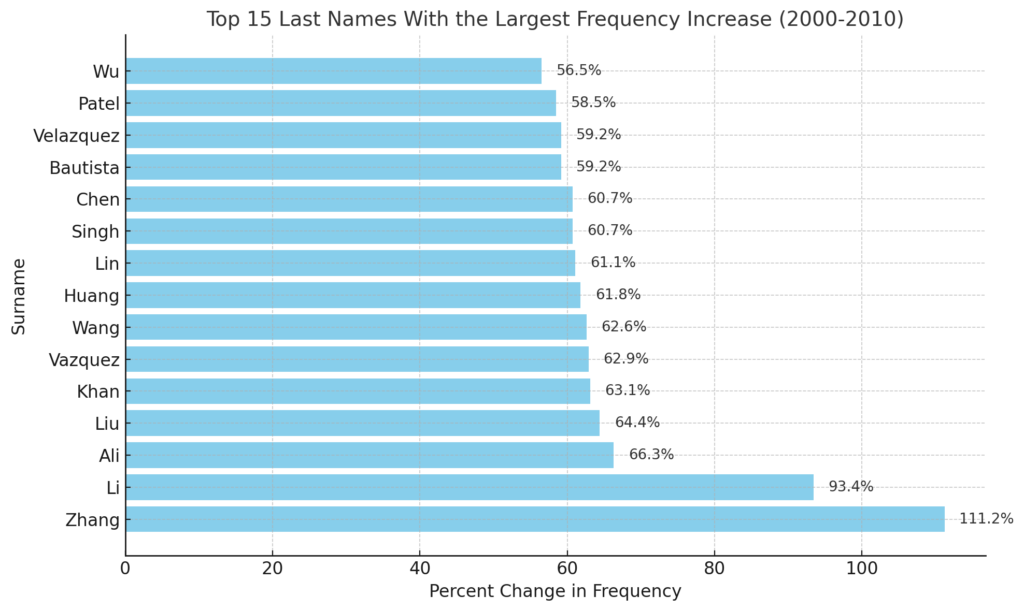Last names work like tiny history books. The list of the most common last names in the United States shows where families started and how they moved.
Some surnames came with early English, Irish, and Scottish settlers. Others arrived later through Spanish-speaking migration, forced movement from Africa, or waves of immigration from Asia and the Middle East.
The latest insights highlight a country that is still changing fast. Hispanic and Asian surnames continue climbing with increased immigration, while long-established European names remain common in many regions.
Put together, the top 100 most common last names can show us the image of society in the United States today.
The following sections will provide more insights into the most popular last names, their history, their heritage, and the trends behind how the rankings keep changing in the United States.
Key Takeaways
- Smith, Johnson, and Williams are the top three most common surnames in the US.
- There are over 150,000 unique last names.
- Asian surnames like Zhang, Li, and Singh are among the fastest-growing.
- The popularity of Hispanic surnames, such as Vazquez, Velazquez, and Bautista, is rising.
Here Are the Most Popular Surnames
| Rank | Surname | Surname Origin | Estimated Population |
| 1 | Smith | English | 2,442,977 |
| 2 | Johnson | English, Scottish | 1,932,812 |
| 3 | Williams | English, Welsh | 1,625,252 |
| 4 | Brown | English, Scottish, Irish | 1,437,026 |
| 5 | Jones | English, Welsh | 1,425,470 |
| 6 | Garcia | Spanish | 1,166,120 |
| 7 | Miller | English, Scottish, German, French, Italian | 1,161,437 |
| 8 | Davis | English, Welsh | 1,116,357 |
| 9 | Rodriguez | Spanish | 1,094,924 |
| 10 | Martinez | Spanish | 1,060,159 |
| 11 | Hernandez | Spanish, Portuguese | 1,043,281 |
| 12 | Lopez | Spanish | 874,523 |
| 13 | Gonzalez | Spanish | 841,025 |
| 14 | Wilson | English, Scottish | 801,882 |
| 15 | Anderson | Swedish, Danish, Norwegian, English | 784,404 |
| 16 | Thomas | English, Welsh | 756,142 |
| 17 | Taylor | English | 751,209 |
| 18 | Moore | English | 724,374 |
| 19 | Jackson | English | 708,099 |
| 20 | Martin | English, French, Scottish, Irish, German | 702,625 |
| 21 | Lee | English, Irish, Chinese | 693,023 |
| 22 | Perez | Spanish | 681,645 |
| 23 | Thompson | English, Scottish | 664,644 |
| 24 | White | English, Scottish, Irish | 660,491 |
| 25 | Harris | English, Welsh | 624,252 |
| 26 | Sanchez | Spanish | 612,752 |
| 27 | Clark | English, Irish | 562,679 |
| 28 | Ramirez | Spanish | 557,423 |
| 29 | Lewis | English | 531,781 |
| 30 | Robinson | English, Jewish | 529,821 |
| 31 | Walker | English, Scottish | 523,189 |
| 32 | Young | English, Scottish | 484,447 |
| 33 | Allen | Scottish, English | 482,607 |
| 34 | King | English | 465,422 |
| 35 | Wright | English | 458,980 |
| 36 | Scott | English, Scottish | 439,530 |
| 37 | Torres | Spanish, Portuguese | 437,813 |
| 38 | Nguyen | Vietnamese | 437,645 |
| 39 | Hill | English | 434,827 |
| 40 | Flores | Spanish | 433,969 |
| 41 | Green | English | 430,182 |
| 42 | Adams | English, Jewish | 427,865 |
| 43 | Nelson | Irish | 424,958 |
| 44 | Baker | English | 419,586 |
| 45 | Hall | English, Scottish, German, Irish, Scandinavian | 407,076 |
| 46 | Rivera | Spanish | 391,114 |
| 47 | Campbell | Scottish, Irish | 386,157 |
| 48 | Mitchell | Scottish, English, Irish | 384,486 |
| 49 | Carter | English | 376,966 |
| 50 | Roberts | Welsh, German | 376,774 |
| 51 | Gomez | Spanish | 365,655 |
| 52 | Phillips | Welsh | 360,802 |
| 53 | Evans | Welsh | 355,593 |
| 54 | Turner | English, Scottish | 348,627 |
| 55 | Diaz | Spanish, Portuguese | 347,636 |
| 56 | Parker | English | 336,221 |
| 57 | Cruz | Spanish | 334,201 |
| 58 | Edwards | English | 332,423 |
| 59 | Collins | Irish, English | 329,770 |
| 60 | Reyes | Spanish | 327,904 |
| 61 | Stewart | Scottish, English | 324,957 |
| 62 | Morris | English, Irish, Scottish | 318,884 |
| 63 | Morales | Spanish, Portuguese | 311,777 |
| 64 | Murphy | Irish | 308,417 |
| 65 | Cook | English | 302,589 |
| 66 | Rogers | English | 302,261 |
| 67 | Gutierrez | Spanish | 293,218 |
| 68 | Ortiz | Spanish | 286,899 |
| 69 | Morgan | Welsh | 286,280 |
| 70 | Cooper | English, Dutch | 280,791 |
| 71 | Peterson | English, Scottish, German | 278,297 |
| 72 | Bailey | Scottish, French | 277,030 |
| 73 | Reed | English | 277,030 |
| 74 | Kelly | Irish | 267,394 |
| 75 | Howard | English, German | 264,826 |
| 76 | Ramos | Spanish, Portuguese | 263,464 |
| 77 | Kim | Korean | 262,352 |
| 78 | Cox | English, French, Welsh, Irish | 261,231 |
| 79 | Ward | English, Irish | 260,464 |
| 80 | Richardson | English | 259,758 |
| 81 | Watson | English, Scottish | 252,579 |
| 82 | Brooks | Swedish, English | 251,663 |
| 83 | Chavez | Spanish, Portuguese | 250,898 |
| 84 | Wood | English, Scottish | 250,715 |
| 85 | James | English, Welsh | 249,379 |
| 86 | Bennett | English | 247,599 |
| 87 | Gray | English, Scottish | 246,116 |
| 88 | Mendoza | Spanish | 242,771 |
| 89 | Ruiz | Spanish | 238,234 |
| 90 | Hughes | English, Irish | 236,271 |
| 91 | Price | Welsh | 235,251 |
| 92 | Alvarez | Spanish | 233,983 |
| 93 | Castillo | Spanish | 230,420 |
| 94 | Sanders | English, Scottish, German | 230,374 |
| 95 | Patel | Indian, Hindu | 229,973 |
| 96 | Myers | German, English | 229,895 |
| 97 | Long | English, Scottish, Chinese | 229,374 |
| 98 | Ross | English, Scottish | 229,368 |
| 99 | Foster | English | 227,764 |
| 100 | Jimenez | Spanish | 227,118 |
Meanings of Popular Last Names
Smith
John Smith remains the most common name in the US today, with 50,440 people, according to Star Courier.
Even as a standalone surname, Smith ranks among the most widespread in the country.
Blacksmithing is one of the oldest skilled trades around, and back in the day, it mattered enough to become a family label.
That is why Smith shows up so often. The name started as a simple way to tag someone by the work they did, then stuck as surnames became standard. Smith did not stay in one place either. You still see it widely in Ireland, Scotland, Germany, and Australia, sometimes in close variants like Smythe, Smyth, or Schmidt.
Run into a Smith now, and the odds point to a blacksmith somewhere up the family line. Some historians also note a religious angle in older records, linking the name to Greek terms associated with “son of god” and “the favored.”
Put all that together, and the scale makes sense: There are close to 2.5 million people in the United States with the last name Smith today.
Johnson

Johnson comes from a simple old pattern in English naming. Add “son” to a father’s name, and you get a surname, so Johnson literally reads as “son of John.”
The same idea sits behind names like Wilson, Benson, or Thomson.
The name took hold in England, Scotland, and Wales, then traveled with early settlers to North America, which explains why it shows up so widely in the United States today.
Current estimates put Johnson at about 1.9 million people nationwide, keeping it firmly in second place, right behind Smith.
Williams
Often, it meant “son of William,” the way Johnson means “son of John.” The name also comes from older German words that point to determination and protection.
Williams has been common in the United States for a long time. In the 1800s, it appeared frequently in places like New York, Ohio, and Pennsylvania, then spread as families moved to new states. That mix of time and movement is why you hear it everywhere now.
If you ever look through old records, Williams keeps popping up. It shows up in census lists, church books, and local documents, so it tends to be a name with a long trail behind it.
There are around 1.6 million people in the US with this last name.
Brown

The surname took root in England, Scotland, and Ireland, and it never stayed only there. It remains common in much of Europe today.
With around 1.4 million people with this surname in the United States, Brown ranks as the fourth most common last name in the country, according to Ancestry.
Since Brown comes from appearance, it raises an obvious question: why don’t other color names show up nearly as often? White made it into the top twenty in the United States, but Red is far rarer, tied to only about one out of every 800,000 people.
Miller
Like Smith, the surname Miller is related to origin. It refers to someone who worked in a grain mill. Today, it is the sixth most common last name in the United States, with around 1.1 million, as noted by ThoughtCo.
The reason why it is unique is the fact that it doesn’t have roots in the English language. Miller comes from Bavaria in Germany, and is derived from the Old Germanic word “Molinari”, which also influenced the similar surname Milner.
Both names originate from the same profession and were used to identify people working in mills.
Origins of Last Names
When a town had five Johns, you had to add something else so everyone knew who you meant.
So a name got tied to a dad, a place, a job, or a nickname, and then it stuck.
After a while, that extra tag turned into a family name passed down, which is why a surname today can still hint at where a line started or what someone long ago was known for.
Most surnames fall into four main categories:
- Patronymic surnames (based on an ancestor’s name)
- Locative surnames (linked to a place or geographical feature)
- Occupational surnames (derived from a person’s profession)
- Nickname-based surnames (inspired by personality or physical traits)
Patronymic Surnames
Patronymic surnames come from a father’s name or an older family name. They work like a built-in clue about who someone came from.
In a lot of cultures, people made them by tacking a short ending or beginning onto a first name to show family descent.
English gives easy examples. Johnson literally means “son of John,” and Robertson means “son of Robert.”
The same pattern shows up all over the world. MacDonald in Scotland means “son of Donald,” and Ibrahimović in Slavic languages points to “son of Ibrahim.”
It’s not unusual for many ethnicities to celebrate their surname as a unique “identity” of their own. That is especially the case in Europe, where some families kept their surnames for hundreds of years. If you want to highlight your surname as a way to express pride and heritage, you can use Custom Printed Pins, which would be especially interesting for some special family events.
Locative Surnames
@knoxstudy Surnames derived from occupations – the repost! #surname #etymology #history ♬ original sound – Knox Study
Locative surnames come from where someone was from. Sometimes it was a town or region, sometimes a landscape feature like a hill, a river, or a valley.
Back when most people lived in small communities, saying where a person came from was an easy way to tell them apart.
Names like Hill or Brooklyn started that way in English. Spanish has examples like Toledo. Italian has Da Vinci, which basically means “from Vinci.”
Even after families moved to new places, the name stayed as a reminder of the original home.
Occupational Surnames
Before surnames were fixed, a job was often the easiest label to add to a first name. Over time, the label became a family name, so a surname can still point to what an ancestor did for a living.
English has plenty of examples: Smith for a blacksmith, Baker for someone who baked bread, Fisher for a person who fished, and Carpenter for a woodworker. German uses the same idea, so Müller means a mill worker, and Schneider means a tailor.
Nickname-Based Surnames
Discover the three most common surnames in each U.S. state for 2024! Is your last name on the list? Check out the full map here: https://t.co/wLSkKuh131 📊 #CommonSurnames #FamilyHistory pic.twitter.com/paEC6PrDLo
— Digismarties (@digismarties) February 20, 2025
Nickname-based surnames came from whatever stood out about a person. Maybe a look, a habit, a bit of personality, or something people in the village joked about.
If the nickname stuck long enough, it turned into a family name that got passed down.
Armstrong likely started with someone known for strength. White could point to light hair or a pale complexion. Goodfellow sounds like a label for someone people saw as friendly or kind.
Over generations, the original reason faded, but the name stayed.
The Fastest-Growing Last Names in the United States
According to census data, we saw a significant rise in certain last names between 2000 and 2010.
Top 15 Most Common Last Names (2000-2010)

Asian Surnames Dominate the List
Names like Zhang, Li, Liu, Wang, Huang, Lin, Chen, and Wu have Chinese roots, and their rise lines up with decades of Chinese immigration and family growth in the United States.
Singh has climbed fast, too, matching the steady expansion of South Asian communities.
Ali and Khan show a similar pattern, with roots in Middle Eastern and South Asian cultures and a noticeable jump in how often they appear.
Hispanic Surnames on the Rise
View this post on Instagram
Vazquez, Velazquez, and Bautista are Spanish-language surnames, and you see them more often now for a simple reason: the Latino population in the United States keeps getting bigger. Census Bureau reports have been pointing to the same trend for years.
More families are arriving from Spanish-speaking countries, and more children are being born in those communities, so the names naturally climb in the rankings.
The Rise of Patel in India
Patel has also been climbing fast. The name is closely tied to Indian heritage, and its rise matches the steady growth of Indian American communities in the United States.
You see Patel more often in places where those communities are strong, especially in medicine, engineering, and business.
Final Thoughts
Names rise and fall for the same reasons cities change. Early settlement left a heavy footprint, so a handful of English and Irish surnames still turn up everywhere.
Newer growth reshapes the list from the other side, with Spanish and Asian names climbing as those communities expand and settle in every part of the country.
Put simply, the most popular last names in 2025 show two things at once: old roots that never went away, and new roots getting stronger every year.


